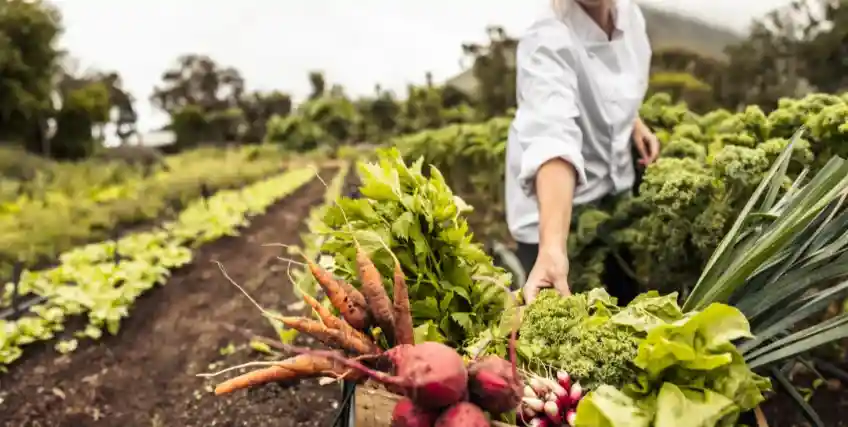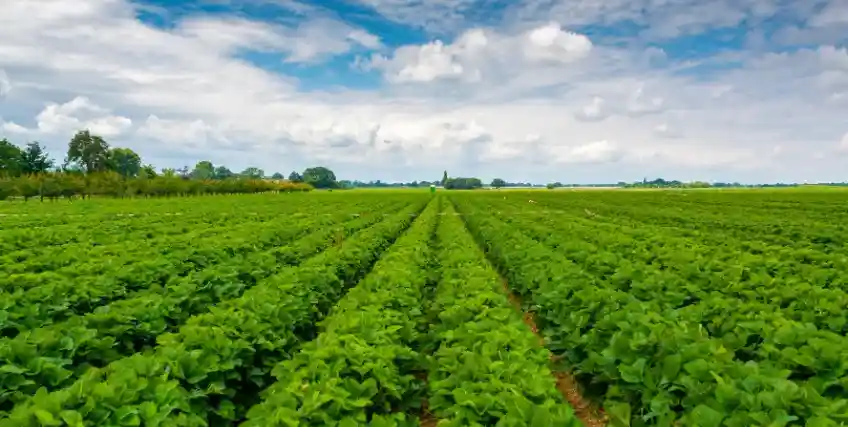Grants for Organic Farmers Funding Opportunities to Grow Your Farm
Oct 14, 2025 | Last Updated on: Oct 15, 2025

Organic farming in the United States continues to grow as one of the thriving sectors. In 2024, organic food sales reached $71.6 billion according to the Organic Trade Association, showing rising consumer demand for healthy, sustainably produced products.
For organic producers and farmers, starting or expanding operations for their organic farming business can be financially demanding. These expenses include certification, soil health improvement, infrastructure investment, food safety compliance, and adopting new organic systems.
Grants for organic farmers help both beginning farmers and established organic producers cover costs while scaling their organic production systems. Grant programs like the Organic Certification Cost Share Program (OCCSP), EQIP (Environment Quality Incentives Program), VAPG (Value-Added Producer Grant), provide essential financial assistance. They support farmers with certification costs, technical guidance, infrastructure development, and marketing.
In this article, we'll discuss how U.S. farmers, ranchers, and small business owners can access grant funding, navigate assistance programs, and strengthen their organic agriculture operations. We'll also see how to apply for grants for organic farmers.
Why Grants for Organic Farmers Matter
Grants for organic farmers are crucial because organic agriculture requires long-term investment to achieve sustainable production. Moreover, farmers require time and money for implementing organic practices, using cover crops, and maintaining soil health. As a result, when switching to organic transition, businesses can face a lot of delays in profit while organic certification costs add upfront financial pressure.
Grants for sustainable farming offer financial assistance programs that help ease these burdens by providing grant funding opportunities. These programs help organic producers cover expenses related to organic certification, infrastructure, organic systems, and market development.
With this support, farmers can improve soil health, expand production, and invest in sustainable practices without relying on high-interest borrowing.
Here's how grants for organic farmers can help:
- Cover organic certification fees through programs like OCCSP.
- Fund technical assistance, training, and organic farming research.
- Support value-added production systems and marketing for organic foods.
Not only these; grants also strengthen the organic industry, local food systems, and farmers markets. They help reduce financial barriers so that organic producers can adopt sustainable practices, increase productivity, and enhance organic production systems.
Types of Grants for Organic Farmers
Here are different types of grants for organic farmers that can be used for various agricultural purposes.
- Federal Grant Programs: Federal grants for organic farmers are managed by USDA (United States Department of Agriculture), FSA (Farm Service Agency), NRCS (Natural Resources Conservation Service), and AMS (Agricultural Marketing Service). These include various competitive grants, assistance programs, farm loans, and technical support.
- State and Regional Programs: State and regional programs provide education initiatives, agricultural grants, and funding for specialty crops, organic foods, and transition support.
- Non-Profit and Private Grants: Various non-profit organizations such as the Organic Farming Research Foundation and Rodale Institute, offer grants for organic farmers. These include funds for organic farming research, organic systems, value-added projects, and sustainability initiatives.
Popular Federal Grants for Organic Farmers
The USDA offers several federal grants for organic farmers to support ranchers and small business operations. These grant programs provide the necessary financial assistance for organic certification, organic transition, improving soil health , and developing value-added products.
By leveraging these opportunities, farmers and small businesses can expand their operations, adopt sustainable practices, and strengthen their place in the growing organic industry.
Organic Certification Cost Share Program (OCCSP)
The OCCSP grant for organic farmers reimburses up to 75% of organic certification costs which should not exceed $750 per certification scope. It lowers barriers to entering the organic industry while supporting sustainable agriculture.
This program benefits:
- Novice farmers entering organic production
- Established organic producers maintaining certification
- Ranchers implementing organic practices
Value-Added Producer Grants (VAPG)
The VAPG grant program helps organic producers to fund projects that add value to agricultural products. The total available funding includes approximately $30 million, out of which the maximum amount for planning grants is $75,000 and for working capital grants $250,000.
Farmers can use VAPG for:
- Developing value-added organic foods
- Building processing or storage facilities
- Marketing and distribution to farmers markets
- Increasing producer income
Environmental Quality Incentives Program (EQIP)
EQIP grant program supports organic farmers with financial assistance for conservation and sustainable organic practices. Its Organic Initiative includes:
- Cover crops to improve soil health
- Water management and erosion control
- Assistance for organic transition
EQIP combines technical assistance with grants to help farmers meet sustainability goals while improving productivity.
Organic Transition Initiative (OTI)
The OTI grant supports farmers converting land to organic production systems. Resources include:
- Training in organic practices and sustainable agriculture research
- Mentorship for beginning farmers
- Guidance on organic certification and food safety compliance
This initiative helps farmers navigate the conversion period and successfully join the organic industry.
Organic Market Development Grant (OMDG)
OMDG grants for organic farmers assists in expanding markets to help increase the consumption of domestic organic agricultural commodities. This grant funding supports:
- Infrastructure improvements for processing organic foods
- Marketing campaigns for specialty crops and value-added products
- Building supply chains for local farmers markets
State-Level and Non-Profit Grant Opportunities
Many states in the U.S. complement federal efforts with their own agricultural programs. They often provide funding opportunities for organic farmers and small business enterprises. These grant programs help farmers and ranchers cover costs for organic certification, support organic transition, and promote sustainable practices.
States provide complementary agriculture programs, including:
- Cost-share programs for organic certification and organic transition.
- Funding for specialty crops, infrastructure, or value-added production.
- Education programs on organic systems, soil health, and organic farming research.
In addition, non-profit organizations such as the Organic Farming Research Foundation (OFRF) and the Rodale Institute provide grants for organic farming research, organic systems development, and community-driven organic agriculture projects. Partnering with them can enhance applications, provide technical assistance, and connect farmers to broader networks of support in the organic industry.
How to Apply for Grants for Organic Farmers
To apply for grants for organic farmers, follow the below steps:
- Check Eligibility: Ensure compliance with USDA, state, or non-profit criteria.
- Prepare Documentation: Include proof of organic certification, financial records, project plans, and organic transition strategies.
- Align Projects with Grant Goals: Highlight impacts on soil health, organic systems, food safety, and sustainability.
- Leverage Technical Assistance: USDA Service Centers, Agricultural Marketing Service, and extension offices can guide applications.
- Monitor Deadlines: Submit applications on time for federal, state, or non-profit grants.
Tips for Successful Grant Applications
Here are some important tips to keep in mind when applying for grants for organic farmers:
- Start with smaller grant opportunities, such as farm start-up or small-scale sustainable farming grants.
- Demonstrate measurable outcomes in soil health, yield, or market expansion.
- Highlight organic practices such as cover crops, regenerative organic systems, and sustainable agriculture research.
- Partner with non-profit organizations, universities, or community groups.
- Show real market demand through farmers' markets and organic foods sales.
- Keep organized records for compliance and reporting.
Challenges and Considerations
Some of the challenges that farmers encounter while applying for grant programs in the U.S. include:
- High competition: Many farmers and organic producers compete for a limited pool of grant funding, making strong applications essential.
- Detailed reporting: Most programs require tracking outcomes, documenting organic farming research, and maintaining compliance with funding rules.
- Matching requirements: Certain grants expect partial financial assistance from the farmer alongside the awarded funds.
Despite these challenges, both new and established organic producers can use grants to strengthen production systems, improve sustainability, and build financially resilient farms.
Therefore by planning carefully and using available resources, these grants for organic farmers become a key tool for long-term success in the organic industry.
You may also like: What Are Ag Loans? A Beginner's Guide for New Farmers
Final Thoughts
For organic farmers, ranchers, and small business owners in the U.S., grants provide essential financial assistance. Federal programs like OCCSP, EQIP, VAPG, OTI, and OMDG, along with state and non-profit organizations, fund organic certification, organic transition, soil health, technical assistance, organic practices, and value-added products.
By identifying suitable grants for organic farmers, preparing documentation, and aligning projects with sustainability and market goals, organic producers can access grant funding opportunities. So, begin by reviewing various grant programs, preparing a structured proposal, and taking the first step towards achieving sustainable growth for your organic farm.
FAQs About Grants for Organic Farmers
1. What types of grants are available for organic farmers?
Organic farmers in the U.S. can access several grant funding opportunities. Federal programs include the Organic Certification Cost Share Program (OCCSP), Value-Added Producer Grants (VAPG), and EQIP. States also provide agriculture programs for organic transition, specialty crops, and market development. In addition, non-profit organizations fund organic farming research and sustainable organic production systems.
2. Who is eligible to apply for organic farming grants?
Eligibility varies depending on the grant program. Typically, organic producers, beginning farmers, ranchers, and small business owners may qualify. Some grants require proof of organic certification or a plan for organic transition. Therefore, it's important to check program-specific rules to ensure your farm meets all criteria.
3. How can grants help with organic certification?
Programs like OCCSP reimburse up to 75% of organic certification costs, easing financial pressure on farmers. They support both beginning farmers and established organic producers. Grants may also fund technical assistance to help maintain compliance with USDA organic production systems. This support ensures farms can stay competitive in the organic industry.
4. Can grants help with farm infrastructure or value-added products?
Many grants focus on improving infrastructure and value-added projects. Programs like VAPG fund processing equipment, storage facilities, and marketing initiatives for organic foods. This helps farmers sell products at farmers markets or through regional distribution.
5. Are there grants specifically for sustainable organic farming?
Grant programs like EQIP and some state initiatives focus on sustainable practices. These grants support organic systems, soil health, and environmentally responsible organic production. Moreover, non-profits also fund sustainable agriculture research and community-based organic agriculture projects. They help farmers adopt long-term organic practices while growing their sustainable production systems.
Frequent searches leading to this page
Term Loans are made by Itria Ventures LLC or Cross River Bank, Member FDIC. This is not a deposit product. California residents: Itria Ventures LLC is licensed by the Department of Financial Protection and Innovation. Loans are made or arranged pursuant to California Financing Law License # 60DBO-35839




